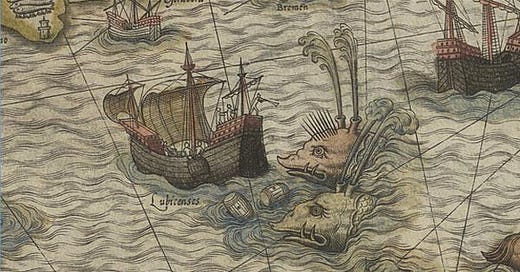Pirates and Fishermen of the Post-Story World
Looking through a spyglass darkly at the spiritual death of story and society.
Here be whales!
Our new post-truism era of storytelling has lost its way. Drifting somewhere between postmodernism and posthumanism, post-pronoun and post-proverb, or simply post-Christian, it floats in a cheap recycled plastic lifeboat void of a rudder, and it is out for blood. Like Captain Ahab’s deranged vengeful lust to slay the white whale, its teeth-gnashing narcissistic urge to slaughter grand narratives and its religious heritage is of the same cloth. Galvanized by the likes of holier-than-thou deconstructionist Lars von Trier to the woke deus ex machinists at Star Wars, who, uncoincidentally, cannot separate preference from fate (whether it is the Force or the magic of Disney), it has long been fashionable to go against the tide of Christian culture. For with metanarrative comes religion, and not just any religion but the law of Christ, and with Christ comes moral truth. Is it any wonder, then, that in our anti-metanarrative, binge-watching culture the most pirated commodity in the vast ocean of consumer goods is mere story?[1] Most of which is not good story, either, but anemic ideological pulp fiction divested of nutritional depth and void of transcendent beauty, conflating honesty and courage for above-the-surface sensuality and hivemind activism. Gratuitous cult-like hedonism is seen as high art; symbolism is self-referential emotivism; a character’s arc is sacrificed for aesthetic “relatability”, politically skewed, vicariously infused dishonesty; a plot is spoon-fed down to a science; a moral of the story is tyrannical; direction is dictatorial; absurdity is thematic unity; a mood swing is a climactic plot twist; montage is vacant of imagery; the camera is straining its voice to virtue signal; and the denouement is robbed of its wisdom. The heart of story has never been less treasured. In fact, I question if people are even pirating at this point. That would imply the stories are worth fighting for.
By deliberately depriving a story of its foundational voice and vision – its inspired source of intentional meaning, imaginativeness, and moral insight – in order to cut loose the culture’s anchor to metanarratives, the storyteller ingratiates to some contrived, foggy sense of euphoric belonging and utopic evanescence, and so another voice takes its place, a new narrator takes the helm. Just as problematic is the mutinous impulse to indoctrinate the viewer; presuming you are intellectually incapable of free thought, they appropriate fictional characters as a podium to preach, to inject their non-diegetic voice into the story world, outright telling you what you need to believe and how you need to act. It is deplorable to let a story unfold, to let a theme organically manifest through plot, to let a viewer explore the breadth of authorial intent, inspiration, and dynamism of a given story. Both approaches to storytelling do not dissuade metanarratives from flourishing, however, all it does is totalize materialism under an avant-garde form of hedonistic revelation. But with a peg leg for a tongue, post-truism can't get its own story straight. Navigating still waters with a double-minded moral compass and no sense of direction, it spins around and around to experience a story come full circle. To know where they’re going is far too colonial, too industrious, so they cringe at escapism and revel in their lubberly. The plot is, henceforth, reduced to dotted lines on a treasure map, where things happen, then more things happen, and other things happen, too, and it leads you back to where you started. But, you see, there is no island of hidden treasure to be found at the end of this story. No, no. You are the map. You are the island. You are the treasure. You are the truth. You may wonder why, then, do you need someone else to affirm this if you are, in fact, all of these things? Well, we live in a time when it's easy to get lost by standing still. So, how did we end up here?
Materialism cannot foster good story. It is way out of its depth. Not unlike the digital pirates, it needs to steal gems of transcendent thought to have any inkling of life whatsoever. Post-truism, for lack of a better byword, is the brainwashed posterchild of postmodernism. In this new world, opinion is a drop of truth in a sea of truth, and the more drops that collocate together, the more popular said opinion is, then the truer it is. It is, therefore, overwhelmed by the perfect storm of social reproof and identity approval. It must abide to be whole, to be honest and happy. Its themes, then, are subject to aesthetic emotional consent. Yet, there are many, if not, more who strongly disagree. Untethered to brute facts, it is caught in a whirlpool of brood facts–––unhinged, implosive, distorted. But that is precisely what they want: pure deconstructionism with no constructive criticism, ambition, or clarity. Plainly said; a theme is only as deep as its metanarrative, and a metanarrative is shallow when moral truth is inconsequential in culture, narrative, and poetry. And if the Christian metanarrative is the open sea by which a writer draws themes to tell their story, post-truism’s makeshift raft cannot withstand the wind or the waves. The sea giveth and the sea taketh away.
It is, no doubt, disconcerting that these first-class passengers floating through life, living someplace between leisure and luxury, have largely given up the auteur’s vision to the wherever the wind blows – the symbolic universe, spiritual insight, cosmic patterns, and thematic continuity of a given story, cinema and literature alike. But it is nevertheless to be expected. When political activism pilots unbridled emotions of pleasure, contempt, lust, conceit, and ecstasy to arouse a ‘moral truth’, a lie is confused for honesty. When death is our friend, meaning is gratuitous. If engulfed by this, art is a one-way ticket to Pleasure Island, a place where all lost boys end up when they don’t care enough to know what it means to be human. Romanticizing a carefree, secluded self-love of mutually exclusive moralism, they grow pale from a lack of empathy and transform into who they truly are: a bunch of asses. The artistic spirit is now a power-hungry enterprise that fishes for treasure with pleasure for bait. Consequently, the theme, the creative rudder and inspiration of the plot, what allows a story to set sail and discover, washes away with the tide and all that remains is a whitewashed plot–––their cheap plastic, fleeting truth. That is not to suggest there is an absence of theme in contemporary storytelling, it is just ankle-deep in a sea of good story, and ankle-deep themes lead to puddle-deep plot where it’s hard to tell the difference between the two. Without metanarrative, the water by which all other narrative is written upon, symbolic patterns and moral significance go from penetrating to peculiar, the pen goes from a two-edged sword that pierces asunder the intents of soul and heart to a crooked, dull hook for a hand, and the thematic depths the sea has to offer is flouted as nothing more than a big blue wet thing. And since we have all but harpooned the Christian story, the founding metanarrative of the Western world, the moral fabric of our culture that which binds a universally shared sense of experience and understanding of being is discontinuous and aimless. To kill the sea is to shoot a (plot) hole in the ship. And for what end? To say that they cast a net on the other side, that they are a fisher of masses? That is to be antichrist! And for what cause? To bring them all aboard a sinking ship, to be the Captain who goes down with it? That is to baptize! The narcissistic urge to crucify Christ again and glorify self only capsizes the heart of story, resurrecting that divine irony against hubris: to ascend to the stars is to sink to the abyss.
Selfishness cannot write good story. Storytelling is not about catching you a fish, it is about teaching you how to fish. Whether parabolic or biographical, fiction or non, the theme is real, it is what you take home with you; to reflect, to edify, to inspire, to enchant, to convict, it is the universal tapestry by which meaning and morality are seamlessly woven together, that which binds value to reality, the transcendent to the deep. And because of this relationship, story is inherently religious. A plot is a catalyst of religious expression, a character is a compass of religious experience, a theme is a pattern of religious belief. To loosen metanarrative, then, is to bind back mythmaking! To kill the Christian story and its moral context is to recycle a hedonistic metanarrative: ensnared by a self-indulgent faith and idle ecclesiastical pursuit of vanity, it takes root in the collective unconscious as something bigger than self. But they’re in a sinking ship. Instead of desperately trying to scoop the water out, post-truism drinks the salt water to live; delirious, dried-mouth, and drowning, the very thing they lusted to slaughter consumes them like the primordial flood. Is it any coincidence that our malnourished, convictionless society, who excessively binge-watch and steal stories for daily bread, despise thematic depth yet crave aboutness, something more than the sum of its parts, as if to satisfy some subliminal dying need? And is it not in vain? Will the plotline save you? Like a fish in the belly of a whale, it begs the question: What is it that we are truly ever after?
Matlock Bobechko | June 7, 2022 – 8:00 AM EST. Revised at 10:09 PM EST.
[1] Damjan Jugovic Spajic, Piracy Is Back: Piracy Statistics for 2022. DataProt. Published on May 17, 2022. https://dataprot.net/statistics/piracy-statistics/.





I went to visit my shrink the other day. He said “I’m going to give you a Rorschach Test.” But because he’s so post-post-modern he couldn’t bother to find ink blots. Instead he just showed me a magazine about Gilligan's Island. What really is an ink blot anyway, I suppose. Well let’s just say that he was shocked to discover that a lot of my problems with society were very nautical.